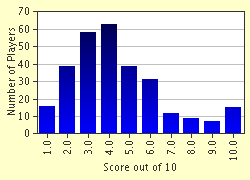Quiz Answer Key and Fun Facts
1. Who said: 'England expects every man will do his duty'?
2. Which British politician caused a sensation in 1948 by describing the Tories (Conservatives) as 'lower than vermin'?
3. The saying 'The Battle of Waterloo was won on the playing-fields of Eton' is attributed to the Duke of Wellington. Irrespective of whether or not he actually said it, there's at least one little problem with this statement. What?
4. Who said: 'The question will be asked whether five hundred men, ordinary men, chosen accidentally from among the unemployed, should override the judgment of millions of people who are engaged in the industry which makes the wealth of the country'?
5. Who said or wrote: 'Methinks I see in my mind a noble and puissant (= powerful) nation rousing herself like a strong man after sleep, and shaking her invincible locks'?
6. Who first said: ' ... all the world over, I will back the masses against the classes'?
7. Who said in August 1914: 'The lamps are going out all over Europe'?
8. On 2 September 1939, a Conservative Member of Parliament called across the House of Commons to Arthur Greenwood, the Deputy Leader of the Labour Party: 'Go on, Greenwood! Speak for England!' Who was it?
9. Who said: 'All those men have their price' (often quoted as 'every man has his price)?
10. This statement by Sir Winston Churchill is well known: 'Let us ... so bear ourselves that if the British Commonwealth and Empire last for a thousand years, men will still say, "This was their finest hour" '. When did he say it? (Hint: When was the outlook for Britain particularly bleak?)
Source: Author
bloomsby
This quiz was reviewed by FunTrivia editor
gtho4 before going online.
Any errors found in FunTrivia content are routinely corrected through our feedback system.

